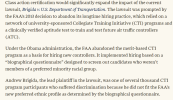Well I’ve talked about it another thread. I have a brother who retired from ATC early (50) in 2020 and one of the major reasons was the poor students that they were getting from OK City. Actually met a guy at a gas station in 2020 once who just retired early (50) as well and stated the same. Worked in ATL tower and said “I got tired of baby sitting kids.” I have controller friends still in the FAA that have backed that up. One friend was a QA guy for the SE region and said “I see operational errors on a regular basis and no accountability.” My brother saw a rise in OEs with no disciplinary action whatsoever. He used to say that mediocrity was the norm now.
Now, is all this exaggeration? Has it always been this way? Well if you look at the stats, OEs have risen sharply about 10 years ago but some of that was due to ATSAP reporting process. Basically ASRS for controllers. Now they’re free to report their mistakes without punitive action. There’s more reporting of errors now but when you have a shortage of personnel and you’re trying to fill seats, you take what you can get. That means, instead of the tried and true method of CTI grads and military veterans, the FAA opened the flood gates to off the street applicants. Combine that with pushing people through training to fill an agenda, then you’re gonna have higher rates of errors.
AI just needs to take over the entire ATC system. AI would never turn down practice approaches for workload.




 I get people are human and can mess up, but then trying to say "it's on the plate" like it's my problem -- can't load what I don't see...I think he might have finally got it when I responded to that with "should I be expecting the ILS or RNAV?"
I get people are human and can mess up, but then trying to say "it's on the plate" like it's my problem -- can't load what I don't see...I think he might have finally got it when I responded to that with "should I be expecting the ILS or RNAV?" 



